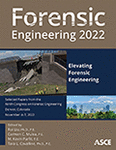Analysis of Local News Articles in Digital (Virtual) Reconnaissance of Buildings and Other Structures after Natural Hazards
Publication: Forensic Engineering 2022
ABSTRACT
Digital, or virtual, reconnaissance methods are growing rapidly in post-disaster assessments; however, there is no standard approach to data collection and the associated limitations have not been widely explored. Digital reconnaissance involves the remote collection of structural performance information from several online sources including government databases, social media, and local news articles. This contrasts with traditional reconnaissance, which involves engineers on-site collecting pertinent information to analyze structural performance. While there are clear benefits to remote data collection such as safety and the number of structures that can be analyzed, the overarching goal of this study is to understand the limitations of this method as a function of the type of online data collected. Specifically, digital reconnaissance was conducted for hundreds of natural hazard events in the United States throughout 2020. The events covered were diverse in terms of hazard type, damage severity, and geography including both urban and rural areas. Semantic analysis of the collected reconnaissance data highlights key terminology to describe structures and corresponding damage that is unique by primary source. These results are significant for future digital reconnaissance efforts by enabling targeted and automated searches for post-hazard information.
Get full access to this article
View all available purchase options and get full access to this chapter.
REFERENCES
Dashti, S., Palen, L., Heris, M. P., Anderson, K. M., Anderson, T. J., and Anderson, S. (2014). “Supporting disaster reconnaissance with social media data: A design-oriented case study of the 2013 Colorado floods.” 11th International Information Systems for Crisis Response and Management Conference, ISCRAM, University Park, PA, 632–641.
Fischer, E. C., and Hakhamaneshi, M. (2019). “The new paradigm of post-disaster reconnaissance: using virtual methods to enhance systematic in-field data collection.” Geo-Strata. 23(3), 60–65.
Foreman, R. (2020). “Oklahoma Regional Weather for 7/11/20.” <https://www.fourstateshomepage.com/weather/regional-forecast/oklahoma-regional-weather-for-7-11-20/>(January 23, 2021).
Google. (2021). “Google News.” <https://news.google.com/>(January 22, 2021).
Graettinger, A., Ramseyer, C., Freyne, S., Prevatt, D., Myers, L., Dao, T., Floyd, R., Holliday, L., Agdas, D., Haan, F., Richardson, J., Gupta, R., Emerson, R., and Alfano, C. (2014). Tornado Damage Assessment in the Aftermath of the May 20th, 2013 Moore Oklahoma Tornado, University of Alabama, Tuscaloosa, AL.
Guan, X., and Chen, C. (2014). “Using social media data to understand and assess disasters.” Natural Hazards. 74(2), 837–850.
Kryvasheyeu, Y., Chen, H., Obradovich, N., Moro, E., Van Hentenryck, P., Fowler, J., and Cebrian, M. (2016). “Rapid assessment of disaster damage using social media activity.” Science Advances, 2(3), e1500779.
Loken, A., Wittich, C., Brito, L., and Saifullah, M. (2020). “Digital reconnaissance and performance assessment of rural infrastructure for 2018 natural hazards”. Journal of Performance of Constructed Facilities, 34(4), 04020054.
Metropolitan Government of Nashville and Davidson County, Tennessee. (2020). “Office of Emergency Management.” <https://www.nashville.gov/Office-of-Emergency-Management.aspx>(January 23, 2021).
NWS (National Weather Service). (2021). “Damage Assessment Toolkit.” <https://apps.dat.noaa.gov/StormDamage/DamageViewer/>(January 23, 2021).
NOAA (National Oceanic and Atmospheric Administration). (2021). “Storm events database: <https://www.ncdc.noaa.gov/stormevents/>(January 22, 2021).
Tucker, J. (2020, March 29). Tornado Causes Damage in Oelwein and Sherrill Areas. KMCH.
US Census Bureau Geography Program. (2019). “2010 census urban area reference maps.” https://www.census.gov/geographies/reference-maps/2010/geo/2010-census-urban-areas.html (January 23, 2021).
Wood, R., Roueche, D., Cullum, K., Davis, B., Gutierrez Soto, M., Javadinasab Hormozabad, S., Liao, Y., Lombardo, F., Moravej, M., Pilkington, S., Prevatt, D., Kijewski-Correa, T., Djima, W., and Robertson, I. (2020). Early Access Reconnaissance Report (EARR): Nashville Tornadoes.
Information & Authors
Information
Published In
History
Published online: Nov 2, 2022
Authors
Metrics & Citations
Metrics
Citations
Download citation
If you have the appropriate software installed, you can download article citation data to the citation manager of your choice. Simply select your manager software from the list below and click Download.
